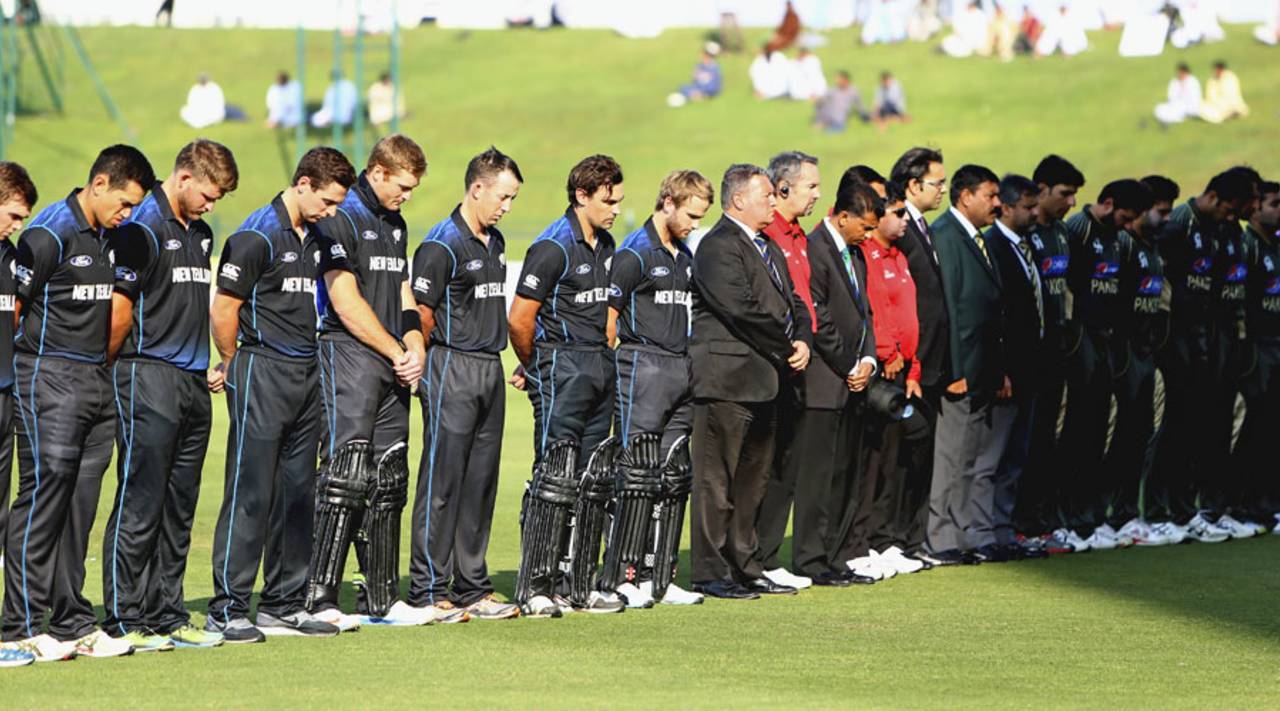Was it right to play the fourth ODI?
Why there really is no point in the PCB trying to get international cricket back to Pakistan
Ahmer Naqvi
18-Dec-2014

Yes, the show must go on, but not in extraordinarily ghastly circumstances like in the case of the Peshawar attack • Getty Images
On Tuesday the 16th of December, a city that has seen almost a decade of unending, unceasing violence saw an attack so barbaric that it shook the entire world. On Wednesday the 17th of December, players from Pakistan, including those from that city, took to the field for the fourth ODI against New Zealand in the UAE.
There was a certain logic for going ahead with the match. Resuming sporting events and other facets of a "normal routine" is meant to show that the terrorists haven't won or scared people from going on with their lives.
However, Pakistan is not an ordinary country where terrorist attacks are rare, unforgettable shocks. This is a country in the midst of a decade-long civil war that has seen horrific attacks so regularly that terror has become normalised. From a political and military perspective, the aftermath of the attack saw an unprecedented acknowledgement that this last assault marked the drawing of a line in the sand. A protracted anti-government movement was called off and a moratorium on death sentences for militants on death row specifically revoked. Regardless of the merits of these decisions, they showcased the fact that there was a broad consensus about dealing with Peshawar differently.
Yet the PCB still decided to go ahead with the cricket.
The decision didn't make sense - yes, the show must go on, and who knows better than Pakistan's cricketers about going ahead with the game? They have now spent five years as nomads and exiles, going on with the game in a desert far from home. They have soldiered on away from their families during natural disasters and repeated, horrific attacks, because they didn't want to let the terrorists take the game away from us. The PCB deserves credit for finding ways to keep cricket alive, and the support of other boards has mattered. But the deaths of more than a hundred children was truly beyond the pale even for a nation as beleaguered as Pakistan, and it was callous of the board to not recognise that.
Instead of cancelling or postponing the game, the PCB released a statement about not giving up, and cited broadcast commitments and the advice of the New Zealand board in coming to its decision. This was despite the fact that several players had been quoted in the media expressing their hesitation about playing, and the New Zealand board repeatedly made clear its desire to comply with the PCB's wishes. So why did the game go ahead?
The claim that it was a response to the terrorists is bizarre. Pakistan are already playing in a foreign country. They have ceded home advantage because of the violence, so there is little point to be made to terrorists. As for broadcasters, the entire cricket world came to a halt as one just days ago to mark the death of Phillip Hughes. While the two incidents are worlds apart and don't bear any comparison with each other, I bring them up here to show that broadcasters are not exactly impossible to deal with.
However, there is one reason that could conceivably be behind the decision, though I have nothing other than speculation to back it up with. Cancelling the ODI would have severely dented the PCB's efforts towards reviving international cricket in Pakistan. We currently have a Kenya side touring the country - a tour that the Pakistan board worked very hard for, and one it had hoped would serve as a springboard for future visits by bigger teams.
The matches against the Kenyan team were not recognised international fixtures, and their being played in a heavily guarded empty stadium was little more than a hollow achievement. Now with the attack in Peshawar, even this low-key tour feels like a remarkably ridiculous move. The perpetrators of the Peshawar attack cited revenge for an ongoing military operation as their motivation, and that fact highlighted why there will never be a good time to have an international team over while we are still a country at war.
Presumably when the board made several well-publicised attempts to bring the game back to the country, it must have pointed to the declining numbers of attacks this past year, and the claimed success of the anti-terrorism operation, as proof that Pakistan was becoming safer for cricketers to visit. Cancelling a match because of a terrorist attack might have sent out a message of solidarity with the victims, but it would have also torpedoed all the work they had done.
I can sympathise with the PCB if this was indeed their reasoning, but the fact remains that we are a country fighting a ferocious, ruthless war, and Pakistan is still not a safe place for its citizens. Unless we can protect our own, it is no use inviting others.
Ahmer Naqvi is a journalist, writer and teacher. He writes on cricket for various publications, and co-hosts the online cricket show Pace is Pace Yaar. @karachikhatmal